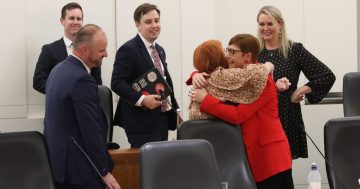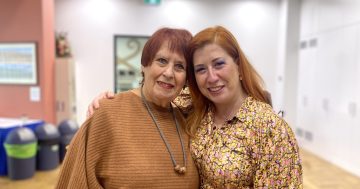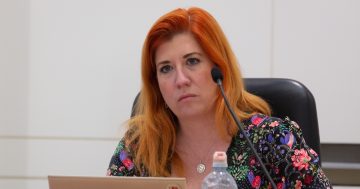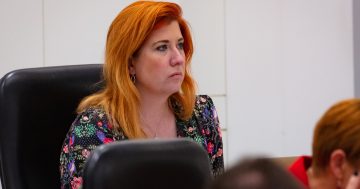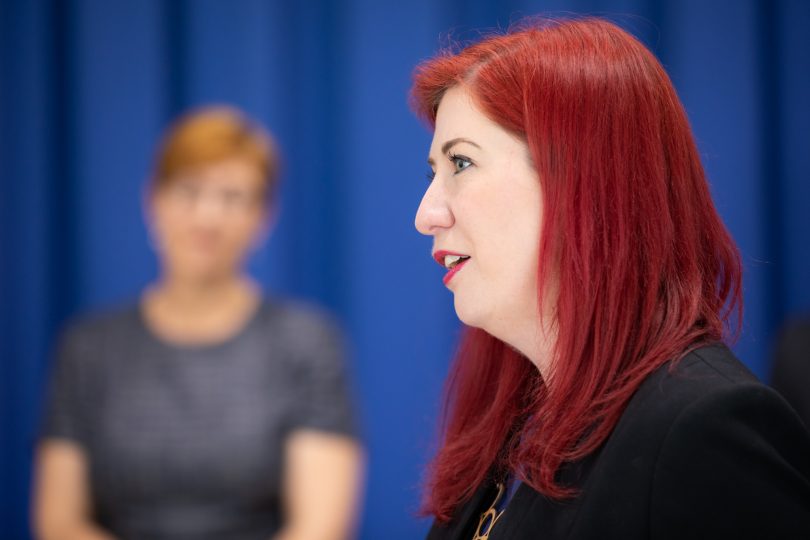
Human Rights Minister Tara Cheyne did not rule out taking the issue to the United Nations. Photo: Michelle Kroll.
Human Rights Minister Tara Cheyne said she has not ruled out going to the United Nations if the Federal Government does not act to reinstate the right of territories to legislate on voluntary assisted dying.
In a rare tripartisan motion, Ms Cheyne joined Attorney-General Shane Rattenbury and Opposition Leader Elizabeth Lee to call out the legislative inequality experienced by Canberrans compared to other Australians.
Ms Cheyne said that regardless of personal views on voluntary assisted dying, there should be no controversy about allowing each territory to legislate on the matter, calling the current limitation cruel, needless and devastating.
The so-called Andrews law preventing the ACT from legislating on the issue, limited residents ability to participate democratically making Territorians second-class citizens, she said.
“Someone who is 15 minutes away across the border in Queanbeyan, for example, has more rights than any other citizen who lives in the ACT,” she said.
Ms Cheyne and the Northern Territory’s Attorney-General, Selena Uibo penned a letter to the federal Attorney-General on the issue at the start of the month.
The letter referred to Australia’s obligation under Article 25 of the International Covenant on Civil and Political Rights which ensures that “every citizen shall have the right and the opportunity … to take part in the conduct of public affairs, directly or through freely chosen representatives”.
Ms Cheyne said it was disappointing that the government had to remind the Commonwealth of its human rights obligations to its own citizens.
Assisted dying was legal in the NT between 1996 and 1997 before the Howard Government passed the Euthanasia Laws Act in 1997, introduced by Victorian Liberal MP Kevin Andrews, which repealed the right and amended both territories’ self-government acts, removing their ability to legislate on the issue.
While the Commonwealth Government has the power to make laws for the ACT and the Northern Territory, it rarely exercises this power.
A vote to repeal the laws was narrowly defeated in the Australian Senate in 2018. ACT Liberal Senator Zed Seselja voted against the bill.
Senator Seselja has since said he would consider an omnibus territories rights bill but would not move to legislate to strike down the Euthanasia Laws Act alone, saying it would create a pathway to legalising voluntary assisted dying.
Ms Lee said she had made direct representations to Prime Minister Scott Morrison and Senator Seselja.
Mr Rattenbury chastised Senator Seselja for voting against the bill, saying that regardless of personal views, the question being considered is about territory rights.
“You do not have to support voluntary assisted dying to support the democratic rights of your constituents,” he said.
“One can only assume that the Senator thinks his own constituency does not deserve the same rights as people in the other states and that the ACT parliament doesn’t deserve the same rights as other parliaments.”
Ms Lee’s co-sponsoring of the motion also marks a change of position for the Canberra Liberals who have previously been apprehensive on the issue and voted against a similar motion in 2014.
She said she had signed the letter on behalf of the Liberals and that the matter would be a conscience vote for their MLAs if legislation to legalise voluntary assisted dying comes before the ACT Assembly.
The Legislative Assembly issued a rebuke to the Federal Government in 2018 when the bill to remove the current restriction was voted down in the Senate.
The rebuke, known as a remonstrance motion, was treated as a conscience vote for the Liberals, with Nicole Lawder, Jeremy Hanson, Mark Parton and Elizabeth Lee voting to pass the motion.












